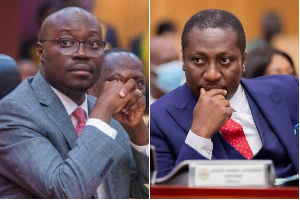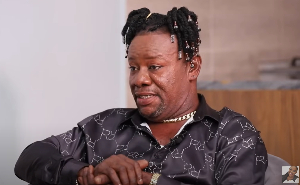According to John W. Gardner, “Our problem is not to find better values but to be faithful to those we profess.” I am motivated to write this piece because of the headlines over the weekend where at the Commonwealth summit, David Cameron and the UK government sought to put pressure on some African countries by threatening to withhold UK aid from governments that do not reform legislation banning homosexuality, thus making this demand a subtle conditionality. The aid in question refers to general budget support which is a type of bilateral aid. Mr Cameron told the BBC One's Andrew Marr Show that, “British aid should have more strings attached.”
It is apt for one to ask the question, “Are they saying that by us having strong values then they would give us less cash? Do they mean to imply that by us standing our ground on subjects like homosexuality then we would receive less cash? What an interesting demand to be making at a time like this. It is in times like this that Carol P. Christ’s assertion that, “Beliefs and values that have held sway for thousands of years will be questioned as never before,” makes so much meaning.
Before ranting and raving and losing one’s head on a subject like this, it is vital to look at the issue in an intricate manner from both sides. Two key questions may consequently arise to ensure a level-headed debate ensues. First, have they got a point? The follow-on question then would be, is the point valid?
In the first place, there is an explicit threat for us to change our stance on certain issues including homosexuality else risk our aid being withheld. What then is their point? In this case, they are donors and a donor has the choice or right to put his money where he wishes. A donation is given without the donor feeling compelled by the donee. So if the British government is giving aid, they reserve the right to choose who and where their aid goes to. The fact then remains that whether we like it or not, they can put their money where they want as it is their own money.
As to arguments about what happened in the past with suggestions of the British plundering our wealth, I shall leave that to my next article; African Backwardness – Imposition or Choice. Sustaining the argument of them being donors, it then reasons that the donor maintains a prerogative and this idea may subsequently justify why they appear to pass the first test posed above.
Nevertheless, the second question posed above may prove more debateable. In reminiscing over the validity or otherwise of their threats, in the frame of affairs, more thought may be supportive. One may find that many of the African democracies have been influenced in one way or the other either explicitly or implicitly by Christianity. In the last century or so, no other country can lay claim to being an exporter of Christianity to African countries more than the British. Many years back, they sent a whole number of missionaries who came to evangelise to us Africans at a time when we did not worship God and were deeply rooted in traditional worship; our own unique form of worship. The English in particular exported Christianity to us which did and continues to shape our thinking.
Additionally, they brought us the Bible, one of their notable legacies bequeathed, which has and still influences our mentality in an explicit manner. In contrast to their earlier proselytising, they are now coming back and requisitioning us to go against the dictates of the Bible that we now hold as authoritative on matters of morality and general living. What a sad turn of events!
Further consideration of the foundations of the British Empire will unearth the vital role that Christianity played in advancing the course of the empire. However, today, in the context of humanly logical wisdom, they have neglected their “first love” and are unabashedly trying to exert pressure on others under the guise of human rights. It is abhorrent how “human rights” act as a shield for many to peddle their own selfish ambitions which in this case is to ask others to also abandon the values which they hold dear.
Under these circumstances and also in view of the fact that the subject of homosexuality remains a very sensitive issue in many cultures, this debate cannot thrive on a quiescent response; it requires those who feel strongly about the issue to express their opinions in an unequivocal manner. After all, today, what kind of strong moral values can Europe set for us to follow? Are we not aware of the moral decadence that is fast pervading their societies? Is that the standard we should be aspiring to? Is that the guide they want us to follow? What sort of role models are they being to us when their people are doing whatever they like to satisfy their sexual proclivities amongst others, in a brazen manner?
For the most part, any well informed person on the social fabric and mentality of the African society will agree that for the second question to do with the validity of their threat, it may be construed as lacking substance and failing to withstand contextual scrutiny. Consequently, it may be perceived as an attempt to rock the boat. This stems from the fact that majority of Africans shun homosexuality and perceive it as a perversion of the moral code. To put it more succinctly, it is an aberration!
Having said that, one would be perceived as lacking a modicum of social awareness to suggest that there aren’t some who favour this practice. It would be vast ignorance to believe that it is not an ongoing practice by both indigenes and foreigners alike. The fact of the matter is that homosexuality is an age-old vice which has refused to go away and one wonders whether it would, considering the influence that some of its proponents wield. Irrespective of that, the vast majority of Africans would shun homosexuality on any day and under any condition. They would never subscribe to homosexuality and changing social opinion may be akin to undertaking a Sisyphean task.
For one country in a position of advantage to ask another to get rid of its values to get more cash is a very sad and unfortunate situation. What such countries forget is that their wealth is God-given and as such it is morally bankrupt to use that wealth to push others to abandon their values. This is totally out of place and would be obdurately frowned on by most African countries.
Furthermore, one may pose a reasonable question along these lines; “Why don’t they ask some countries with questionable “human rights” to amend their ways else they would cease buying oil or discontinue trading with them? Well, for most countries, Africa is synonymous to a beggar carrying a cup and chasing a rich man for some loose change he (the beggar) badly needs to survive. This has thus given them the power and authority to dictate to us how to live our lives. Is this neo-colonialism dressed like Father Christmas asking a child to behave well for some sweets?
In sharp contrast to some of their demands, I remember that not long ago, Theresa May, the UK Home Secretary told the Sunday Telegraph she “personally” would like to see the Human Rights Act scrapped just because of the problems it caused for the Home Office. How unbelievable! She told her party conference in Manchester that: “I'd personally like to see the Human Rights Act go because I think we have had some problems with it. I see it here in the Home Office, particularly, the sort of problems we have in being unable to deport people who perhaps are terrorist suspects. Obviously we've seen it with some foreign criminals who are in the UK." Prime Minister David Cameron said he agreed with Mrs May that the act should be scrapped and replaced with a British Bill of Rights. At this juncture the reader can make his or her mind up about these apparent double standards.
Naturally, this issue makes me think of issues in a broader sense. It is becoming obvious in the day that we live in that morality appears not to hold any longer and if one has strong values, they are highly likely to have less “cash”. Let’s bring the discussion to our own country and apply it to ourselves. Up and down the country, people find themselves in offices and departments that we all know about (without the need to name and shame anybody) where if you choose to maintain strong values, you will never make it. It is an informal rule that one is expected to bend the rules and cave in to pressure if one wants to make more “cash”.
It is sad that society today does not really celebrate people who stand for their values. We have become a people who pay lip service to the essence of morality by doing very little to celebrate it. On the other hand, we have allowed people with convoluted views and notions of morality to assume positions of influence.
So while we think about or focus on what the British government is seeking to do, I personally believe we should do well to ask ourselves this vital question: “Do we as individuals cherish and celebrate strong values, or we are ready to just cave in and take some shortcuts to make some quick bucks?
Dwight D. Eisenhower finds that: “A people that values its privileges above its principles soon loses both.” For what the British government is contemplating, what history would teach us is that when an issue comes up like this, it generates a transient brouhaha and when the dust settles...before we know it, most nations begin to cave in because of the perceived financial penalty “suffered.” With this view of history, perhaps John Ratzenberger’s direction that, “Find people who share your values, and you'll conquer the world together,” may hold sway if history is not to be repeated. This gives the idea of strength in numbers.
A vital clarion call from this piece is for us to prove to the so-called “masters” that we are not puppets and that we would maintain a resolute stand today and tomorrow with no view to give away our values. However, for us to come to that level, it must begin individually. It must be a collection of individual resolves culminating in a homogenous conclusion of affairs to weather the strategy of divide and rule which has been used to exploit chinks in our armoury. Any division in our ranks would be exploited and if we are not careful we would shed off our values before realising it.
In conclusion, this article leaves the reader with a thought for deep reflection; “Would you would rather have strong values for less “cash” or less values for more “cash”?
God bless our continent and light it up from being seen as the Dark Continent.
Dr. Frank Robert Silverson has written other articles available online. Blog: www.franksilverson.blogspot.com Email: frsilverson@yahoo.com
Opinions of Thursday, 3 November 2011
Columnist: Silverson, Frank Robert


















